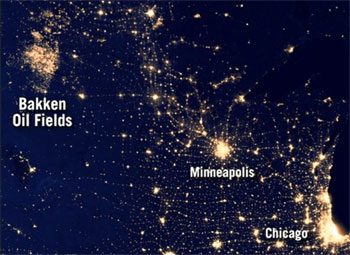A new study counters the widely held view that natural gas is critical for lowering carbon emissions.
Because low natural gas prices have recently resulted in less use of coal, it is currently contributing to lower emissions (and also nitrogen oxide and sulfur dioxide emissions), but that trend comes to an end around 2020, conclude researchers from Stanford University’s Energy Modeling Forum (50 company, government and university experts).
After 2020, natural gas begins displacing more than coal – low gas prices make it hard for renewable energy to compete, which would of course, produce much lower, if not zero emissions. Low natural gas prices also stimulates more energy consumption, which means more emissions.
Why 2020? Because after that targets for carbon emissions must become much more stringent to keep global temperatures from rising more than 2 degrees C. If we rely on natural gas after that, we cannot get emissions down to where they need to be.
The natural gas industry accounts for 17% of US greenhouse gas emissions, predicted to grow to 23% as shale gas replaces conventional natural gas, according to a Cornell University study.
This photo shows natural gas flaring as seen from a satellite – brighter and bigger than nearby cities:

In terms of the economy, shale development also doesn’t contribute anywhere near as much as pundits would have us believe. Although the industry will inject $70 billion into the economy every year for several decades, that amounts to only 0.46% of the $15 trillion US economy. The gains would mostly be felt in natural gas supply chain.
The authors conclude that continued shale gas development in North America is likely to have more sweeping impacts on future energy prices than on the economy or the environment.
Also Dampens Interest in Energy Efficiency
About $300 billion was invested worldwide in efficiency in 2011, about the same as renewable energy or fossil-fuel power generation, finds the International Energy Agency (IEA) in its Energy Efficiency Market Report.
"Indeed, the degree of global investment in energy efficiency and the resulting energy savings are so massive that they beg the following question: Is energy efficiency not just a hidden fuel but rather the world’s first fuel?," asks Maria van der Hoeven, Executive Director of IEA.
In 2010, for example, energy savings exceeded the output from any other single fuel source! The 11 IEA member countries avoided burning 1.5 billion tons of oil equivalent because of efficiency gains developed since 1974.
But persistently low natural gas prices could de-incentivize continued investments in energy efficiency. High oil prices have driven effective policies on energy efficiency, such as appliance standards.
"Having accomplished a solid decade of often double-digit growth, US energy-efficiency markets have grown from a footnote to a force to be reckoned with," says IEA. "Since U.S. energy efficiency markets derive largely from federal and state policies, they are particularly vulnerable to political and economic developments."
"From a climate perspective, then, the shale gas revolution is essentially irrelevant – and arguably a massive diversion of resources and money that could have gone into deploying carbon-free sources," says Joe Romm, Founding Editor of Climate Progress. And the study doesn’t examine the high rates of methane leakage that are currently undermining any short-term climate benefit from shale gas, he notes.
This summer, the Center for American Progress released a report on this, which concludes: "There needs to be a swift transition from coal to a zero-carbon future by ensuring that the use of natural gas, particularly in the electric-power sector, peaks within the next 7-17 years."
Luckily, there could be much less natural gas than commonly thought and it could well fizzle on its own.
Here is the Stanford study:

 Loading...
Loading...
Baloney. Its appalling that people with an agenda thats hidden still try to convince the world about some kind of global warming. temps are proven to actually be cooling, and are predicted to continue cooling as the earth goes thru natural cycles. 20 years ago the headlines were all about a coming ice age, now its global warming. its all hogwash. One volcanic eruption puts more pollution in our atmosphere than all of mankind over centuries ever has. Stop the propaganda and stop trying to instill more taxes on things that are invisible and that dont exist. Shame on you.
“Get Real”
All the scientific studies and data I have seen confirm there is a warming trend occurring. However, there will be plateaus in the trend and even years or several years in which the average temperature my retreat somewhat. But, remember the overall temperature trend has be up over many decades and the data I have seen supports the continuation of that upward trend.
Don’t know where you are getting your information, but if is from the fossil fuel energy industry and their backers you should double check the data they are giving you.
There has been a slow down in the greenhouse gases going into the atmosphere as a result of the worldwide economic slow down which resulted from the financial crisis, the Great Recession and the continuing aftermath of these events. Once the world’s economy gets backup and fully running we will likely be putting more greenhouse gases than ever into our atmosphere.
The warming trend is there, just research the issue for yourself.